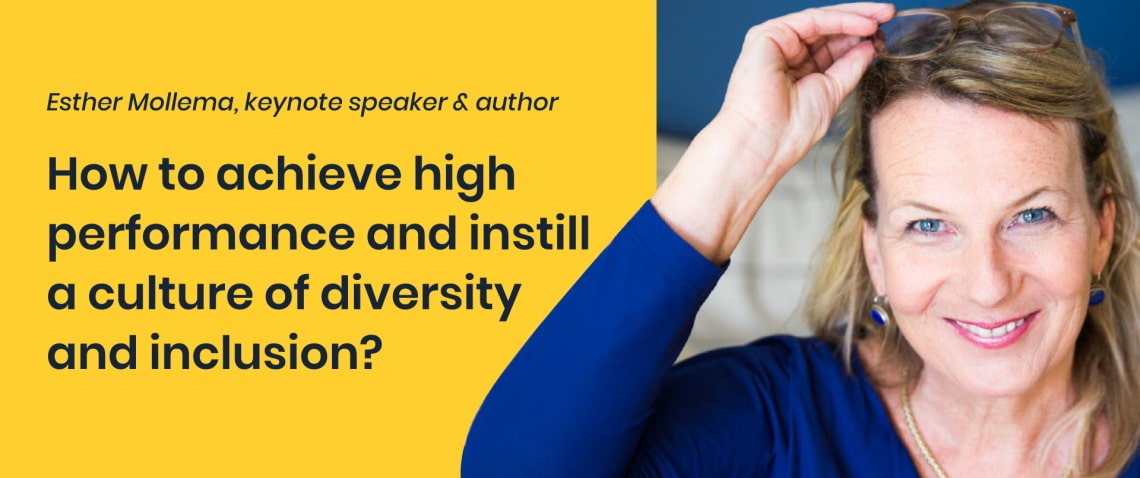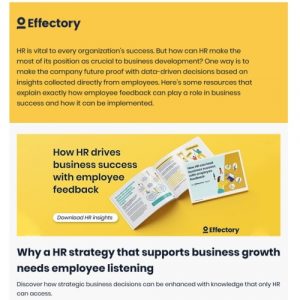The Black Lives Matter movement has sparked lively debate in recent weeks. Many organizations are now wrestling with questions such as: Are we inclusive? What does it actually mean to be an organization that promotes diversity and inclusion? Why is it so important? And how can we as organizations improve? Esther Mollema, founder of Direction Europe and the HPO Center, shares some answers.
Promoting diversity and inclusion in your organization

Esther Mollema is an expert, author and sought-after speaker on the subjects of high-performance organizations (HPOs), leadership and diversity. She believes that the power of organizations lies in the differences between their individual members. In this blog she shares her experience and some practical tips. Read on to find out how to make sure your organization is diverse and inclusive.
Inclusion = innovation
Inclusion is all about questions such as: Can I be myself? Do I feel heard? Do I feel engaged? And do I feel safe? Within organizations, inclusivity is the key that unlocks innovation. It’s an essential component for delivering business recovery, imagination and resilience – extremely important factors, especially in times of crisis.
Diverse and inclusive teams perform better than homogeneous teams
Research shows that diverse, inclusive teams perform better than homogeneous teams. Why? Because we perform better when we feel a tiny bit outside our comfort zone. And this is what happens in a group made up of diverse individuals. What’s more, we perform at our best if we feel we can be ourselves. If people are constantly having to change in order to fit the norm, it saps their energy — leaving them without enough in the tank to actually achieve results. And that’s something of a travesty! So in 2020, it’s high time that organizations embraced diversity and inclusivity.
The brain is a weird and wonderful thing
Why, when we know all this background information, do we still find it so difficult to be inclusive? Because our brain likes to play tricks on us. The brain does not like to be challenged continuously, which is why our brain makes us think that we will work more effectively in homogeneous teams — and it couldn’t be more wrong. What’s more, most of the decisions we take happen unconsciously. Only 5% of our decisions are truly considered, which means the rest are subject to bias.
Unconscious bias
People can be quick to jump to conclusions, and we make these judgments both with our eyes and with our ears. Some 55% of our thoughts and ideas are influenced by what is right before our eyes — we see something, or how it looks, and so we feel we know it. What we process with our ears makes up a further 38% — we hear something, process the language and accent, and we feel we know it. Actual knowledge (i.e. is this person capable?) accounts for just 7%. This leads to discrimination on the basis of factors such as skin color and gender. And the Netherlands is no exception. Research conducted in 66 countries reveals that the Netherlands has the biggest discrepancy between self-image and established bias. In the Netherlands we like to think that we don’t discriminate, but we do. And it is this denial that is at the heart of the problem.
Receive the best HR articles in your mailbox
Subscribe to our newsletter and you will receive the best HR articles on a quarterly basis.
Sign upWhat can we do to promote diversity and inclusion?
It’s time for change! Unfortunately, the reality is that bias will always be a factor. That’s simply how our brain works. But that doesn’t mean we simply have to accept it. So start today: talk, listen and learn. Ask yourself and your team: Where are we at? Are we still in denial? Is our approach passive, or are we aware and active? You could also develop a framework for processes (equality by design), so that you can systematically prevent bias.
Equality by design
The framework is transparent, honest, predictable and does not allow exceptions. In short, a great design for delivering equal opportunities, diversity and inclusiveness and that should including the following elements:
Culture of inclusivity: Is our corporate culture inclusive enough?
Recruitment: Are our recruitment processes focused on diversity and does everyone have equal opportunity?
Onboarding: Can people be themselves, and can they put their unique talents to use?
Evaluation and promotion: Does everyone have equal opportunity?
Decision-making process and employee engagement: Is everyone involved (in making decisions)?
Daily routines: For example, are you as a manager available to everyone?
Want to find out more about diversity and inclusivity?
Thank you, Esther, for this interesting webinar! Are you keen to find out more about diversity, inclusivity, crisis management, leadership and being a good employer? Each week, Effectory hosts a free webinar covering a topic that is relevant to the times we now live in.
Book a free demo. See our solutions in action.
Effectory is Europe’s Leading provider of Employee Listening Solutions. Schedule a product demo and discover how to enhance your employees’ engagement.
Demo request
